|
|
|
Sort Order |
|
|
|
Items / Page
|
|
|
|
|
|
|
| Srl | Item |
| 1 |
ID:
112511
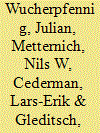

|
|
|
|
|
| Publication |
2012.
|
| Summary/Abstract |
Previous research has focused primarily on how ethnicity may trigger civil war, and its effect on conflict duration remains disputed. Rather than treating conflict as a direct consequence of ethnic cleavages, the authors argue that ethnicity per se does not affect civil war duration. Instead, its effect depends on its relationship to political institutions. They employ a dyadic approach that emphasizes the political context in which both government leaders and nonstate challengers can capitalize on the ascriptive nature of ethnicity. They show that although states can initially benefit from politicizing ethnic relations, once violent conflict breaks out, such policies may backfire on the government and make it difficult for incumbent governments to accept settlements that could terminate conflicts. Past policies of ethnic exclusion also benefit rebel organizations fighting the government, since the resulting grievances increase collective group solidarity and render individual fighters more cost tolerant. Using a new data set that codes the nexus between rebel organizations and ethnic groups, as well as information on ethnopolitical exclusion, the authors find considerable support for their propositions.
|
|
|
|
|
|
|
|
|
|
|
|
|
|
|
|
| 2 |
ID:
152293
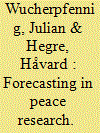

|
|
|
|
|
| Summary/Abstract |
Prediction and forecasting have now fully reached peace and conflict research. We define forecasting as predictions about unrealized outcomes given model estimates from realized data, and predictions more generally as the assignment of probability distributions to realized or unrealized outcomes. Increasingly, scholars present within- and out-of-sample prediction results in their publications and sometimes even forecasts for unrealized, future outcomes. The articles in this special issue demonstrate the ability of current approaches to forecast events of interest and contributes to the formulation of best practices for forecasting within peace research. We highlight the role of forecasting for theory evaluation and as a bridge between academics and policymakers, summarize the contributions in the special issue, and provide some thoughts on how research on forecasting in peace research should proceed. We suggest some best practices, noting the importance of theory development, interpretability of models, replicability of results, and data collection.
|
|
|
|
|
|
|
|
|
|
|
|
|
|
|
|
| 3 |
ID:
152302
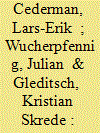

|
|
|
|
|
| Summary/Abstract |
Many scholars have detected a decrease of political violence, but the causes of this decline remain unclear. As a contribution to this debate, we revisit the controversy over trends in conflict after the end of the Cold War. While many made ominous predictions of surging ethnic warfare, Gurr presented evidence of a pacifying trend since the mid-1990s and predicted a further decline in ethnic conflict in an article on ‘the waning of ethnic war’. Leveraging more recent data on ethnic groups and their participation in ethnic civil wars, this study evaluates if Gurr was right about the decline of ethnic conflict, and if he was right for the right reasons. We assess whether an increase in governments’ accommodative policies toward ethnic groups can plausibly account for a decline in ethnic civil war. Our findings lend considerable support to an account of the pacifying trend that stresses the granting of group rights, regional autonomy, and inclusion in power-sharing, as well as democratization and peacekeeping.
|
|
|
|
|
|
|
|
|
|
|
|
|
|
|
|
| 4 |
ID:
140817
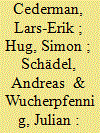

|
|
|
| 5 |
ID:
120168
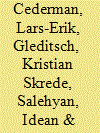

|
|
|
|
|
| Publication |
2013.
|
| Summary/Abstract |
A series of studies has shown that civil wars are caused not only by factors inside countries, but also by effects operating across state borders. Whereas a first wave of quantitative studies demonstrated that such effects make the "closed-polity" assumption untenable, more recently researchers have identified particular causal mechanisms driving conflict. Despite these recent advances, a central puzzle remains unresolved, namely why ethnic groups that at least in theory could count on support from large transborder ethnic kin (TEK) groups often have remained surprisingly peaceful, such as the stranded Russian populations in the "near abroad." We propose a theoretical framework that extends the analysis from the primary dyad between the incumbent and the challenger group by adding a secondary dyad that pits the incumbent against the TEK group. We postulate a curvilinear effect of the TEK group's relative size on conflict onset. Using a new data set on transnational ethnic links, we find that that the risk of conflict increases within the middle range of the size spectrum, consistent with our main hypothesis. This means that large TEK groups have a conflict-dampening effect, provided that they control their own state. Excluded TEK groups, however, are not associated with lower conflict probabilities.
|
|
|
|
|
|
|
|
|
|
|
|
|
|
|
|
|
|
|
|
|